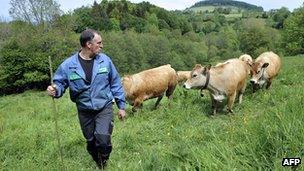EU to cut subsidies to big farms
- Published

French farmers, like this one in Laqueuille, typically have smaller holdings than in the UK
European Union negotiators have agreed a package of reforms to agricultural subsidies which will see big farms lose up to 30% of their payout.
Ministers reached a deal with Euro MPs and the European Commission.
However, environmentalists say many of the green measures in the original proposals have been swept away.
The Common Agricultural Policy (CAP) and rural development payments account for nearly 40% of the EU's long-term budget.
The plan is to spend about 50bn euros (£42bn; $65bn) annually on agriculture in 2014-2020.
Under the deal reached on Wednesday, some of the money withheld from big industrial farms will be redistributed to smaller farms, with an emphasis on those that use eco-friendly methods.
Sugar shortages
The deal still has to be approved by EU governments and the European parliament.
Officials are confident that that will happen, because ministers and parliamentarians have been involved in the negotiating process, says the ┤¾¤¾┤½├¢'s Europe correspondent Chris Morris, in Brussels.
Negotiators also agreed to end EU sugar production quotas which critics say have distorted the market for years, and created artificial shortages.
The definition of an "active farmer" has also been contentious. The current payments system is largely based on land area and past subsidy levels, meaning that landowners like airports and sports clubs, which do not farm, have been getting subsidies on the basis of their grasslands or other eligible land areas.
The ministers have agreed on a "short mandatory negative list comprising airports, railway services, waterworks, real estate services and permanent sports and recreational grounds".
Our correspondent says the UK agriculture minister abstained in voting on one of four new regulations, arguing that some member states wanted to go back to the days of butter mountains and wine lakes.
In the 1970s and 80s the CAP took up a bigger share of the EU budget because there were more subsidies for farmers simply to produce. That led to wasteful overproduction.
- Published21 June 2013
- Published1 July 2013
- Published14 May 2013